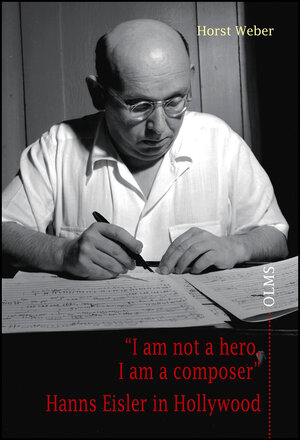
×
![Buchcover ISBN 9783487147871]()
"I am not a hero, I am a composer" - Hanns Eisler in Hollywood
von Horst WeberAus der zerstörerischen Heimat flieht Eisler 1933 in die rettende Fremde, aus den USA vertreibt ihn 1948 das Committee on Un-American Activities, zurück in die zerstörte Heimat. Anziehung und Abstoßung vertauschen im Exil ihre Pole.
In Hollywood komponiert er für die Filmindustrie und kritisiert sie zugleich in seinem Buch 'Komposition für den Film'; mit seiner Filmmusik ist er zwar erfolgreich, aber seine ernste Musik wird nicht beachtet; zeitweise verdient er gut, doch Schulden zehren immer wieder die Einkünfte auf. In seinen Liedern aus Hollywood beklagt er die Barbarei der Heimat und die Öde der Zuflucht.
Erzählt wird vom unsteten Leben im Exil, von den Spielregeln der Hollywood-Gesellschaft und von den politischen Hintergründen seiner Verfolgung. Interpretiert werden seine Kompositionen, seine 'Kunst zu erben' und seine Ästhetik der displaced form.
Bisher unbekannte Quellen, u. a. das Protokoll seiner ersten, nichtöffentlichen Vernehmung durch das Komitee, werden vorgestellt und ausgewertet. Es entsteht das facettenreiche Bild eines melancholischen Kämpfers, der um Gradlinigkeit bemüht, doch von Widersprüchen gezeichnet war.
***
In 1933 Eisler fled his destructive homeland to find safety abroad; in 1948 the Committee on Un-American Activities forced him out of the USA back to his destroyed homeland. The polarities of attraction and rejection were reversed in exile. In Hollywood he composed for the film industry while at the same time criticising it in his book Composing for the Films. His film music may have been successful but his serious music was ignored. Sometimes he made money, but his income was continually swallowed by debts. In the songs he wrote in Hollywood he laments the barbarism of his native country and the desolation of his refuge. This is the story of an unsettled life in exile, of the rules of the Hollywood game and of the political background to Eisler’s persecution, with interpretations of his compositions, his “art to inherit” and his aesthetic of the displaced form. Previously unknown sources, including the report of Eisler’s first unpublished interrogation by the Committee, are reproduced and evaluated, creating a multi-faceted picture of a melancholy fighter who longed for things to be straightforward but was characterised by contradictions.
***
In 1933 Eisler fled his destructive homeland to find safety abroad; in 1948 the Committee on Un-American Activities forced him out of the USA back to his destroyed homeland. The polarities of attraction and rejection were reversed in exile. In Hollywood he composed for the film industry while at the same time criticising it in his book Composing for the Films. His film music may have been successful but his serious music was ignored. Sometimes he made money, but his income was continually swallowed by debts. In the songs he wrote in Hollywood he laments the barbarism of his native country and the desolation of his refuge. This is the story of an unsettled life in exile, of the rules of the Hollywood game and of the political background to Eisler’s persecution, with interpretations of his compositions, his “art to inherit” and his aesthetic of the displaced form. Previously unknown sources, including the report of Eisler’s first unpublished interrogation by the Committee, are reproduced and evaluated, creating a multi-faceted picture of a melancholy fighter who longed for things to be straightforward but was characterised by contradictions.


